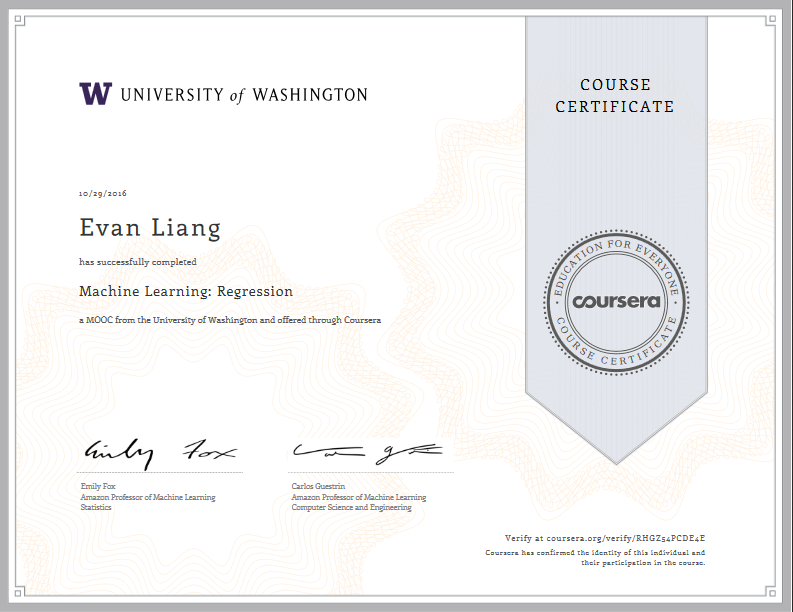ML Regression: a Review
In my opinion, the second course of University of Washington's ML class on Coursera was much more challenging compared to their first. At the same time, Dr. Fox did an outstanding job explaining concepts that would have most likely been difficult for me to grasp. I did have to rewatch some parts multiple times, but I never had to seek outside knowledge in order to understand a concept. The visuals, animated graphs, and detailed explanations were enough to help me understand.
I noticed that some parts of videos were sped up, especially when she was just writing annotations. In the survey course, I was a little annoyed by the amount of time spent on writing and so I appreciated that this was done.
One of my biggest complaints is that I wish I had a professor or TA did office hours. Some of my questions on the forum went unanswered, even if others chimed in that they had the same issue as me. And once, my question was mysteriously deleted (I might have included too much code in the question?). I felt that when I was close to a solution, I was on my own. Based on the timestamps in the forum, I think a lot of people have been working ahead since Coursera allows them to. They're not restricted to be on the same week as I do, which stinks since on top of lack of mentors, there is a lack of peers to respond to my (and other peoples') questions.
The other complaint I had was not really regarding the course itself. Using Graphlab-Create was sometimes a huge pain. I understand that it is good for demoing and the instructors do not want to overwhelm with all the parts of sci-kit learn (especially since it's not within their control). But there were a few times when I felt like I learned the material well, but I'd still spend hours trying to get things to work properly with GL-C. I was not a fan of trying to understand error messages that were not even in my own code. So during the week 5 assignments, I made the switch to sci-kit learn and a lot of my problems melted away. Unlike in the Survey course, the Regression course encourages students to use either tool and provides help/tips in the right direction for both tools.
The homeworks felt like an interactive recap lesson. They helped me apply the algorithms I learned in the lectures, but there's no homeworks that force me to "think on my own." While I may understand the content and what's happening under the hood of all of the applications, I have issues with retention along with knowing when to apply. Time and practice in real-world applications will definitely help with that.
So now that I am done with this course, I am going to take a break from classes in order to apply this knowledge. I have a lot of data at work where I can do linear regression. My boss is onboard with me doing 20% time for research (similar to Google's "20% time" I heard about when I was still in high school). So over the next few months, I'll try out various things--first in Python, and then in F#. I'll probably need to rewatch many of these videos and look elsewhere to go in more depth. For me, this is probably the best way I can really learn. Stay tuned for a post on what this will all be about!

